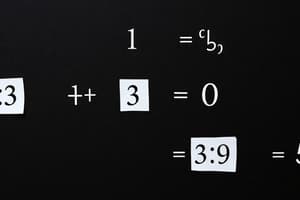Podcast
Questions and Answers
Explain the rules for writing numerical expressions with whole-number exponents.
Explain the rules for writing numerical expressions with whole-number exponents.
The base must be a non-zero real number or variable, while the exponent can be any non-negative integer, including zero.
What is the value of 3^2?
What is the value of 3^2?
9
Evaluate (-4)^2.
Evaluate (-4)^2.
16
Simplify the expression 2^3 * 2^4.
Simplify the expression 2^3 * 2^4.
Explain how to evaluate 5^0.
Explain how to evaluate 5^0.
What does PEMDAS stand for?
What does PEMDAS stand for?
How should you prioritize operations when simplifying numerical expressions with exponents?
How should you prioritize operations when simplifying numerical expressions with exponents?
In the expression (2x + 3)^2, what is the simplified form?
In the expression (2x + 3)^2, what is the simplified form?
What field uses exponential relationships like F = kx^n?
What field uses exponential relationships like F = kx^n?
What is compound interest an example of?
What is compound interest an example of?
Flashcards are hidden until you start studying
Study Notes
Numerical Expressions Involving Whole-Number Exponents
Whole-number exponents play a significant role in mathematics, particularly when dealing with algebraic expressions. These exponents can help us understand patterns, solve equations, and manipulate variables. In this article, we will discuss how to write numerical expressions involving whole-number exponents, evaluate them, follow the order of operations, simplify them, and explore their applications.
Writing Numerical Expressions with Exponents
When writing numerical expressions using whole-number exponents, it's essential to follow specific rules. The base must always be a non-zero real number or variable, while the exponent can be any non-negative integer, including zero. Here are some examples:
- Base^Exponent = Without Exponent = Base
- 3^2 = 9
- 5^0 = 1
- (-3)^2 = 9
- x^5 = 5x^(4 + 1) = 5x * x^4
These rules ensure that our mathematical expressions remain consistent and understandable.
Evaluating Numerical Expressions with Exponents
Evaluating numerical expressions with whole-number exponents involves substituting values into the expression and performing the necessary calculations. Here are some examples:
- 2^3 = 8
- (-2)^3 = -8
In these examples, we substitute the value of x with a specific number (either 2 or -2) and calculate the result using the exponent rules mentioned earlier.
Order of Operations with Exponents
The order of operations, commonly known as PEMDAS (Parentheses, Exponents, Multiplication and Division, Addition and Subtraction), plays a crucial role when working with numerical expressions involving whole-number exponents. Here's how each operation is prioritized:
- Parentheses: Perform any calculations inside parentheses first.
- Exponents: Calculate any terms with exponents next.
- Multiplication and Division: Perform multiplication and division from left to right.
- Addition and Subtraction: Finally, perform addition and subtraction from left to right.
By following this order, you ensure that your calculations are always accurate and consistent.
Simplifying Numerical Expressions with Exponents
Simplifying numerical expressions with whole-number exponents often involves applying the distributive property, combining like terms, or using the zero exponent rule. Here's an example:
(2x + 3)^2 = 4x^2 + 9
In this example, we distribute (2x + 3)^2 to get 4x^2 + 6x + 9, then simplify further by combining like terms to get 4x^2 + 3x + 9.
Applications of Numerical Expressions with Exponents
Numerical expressions involving whole-number exponents have numerous applications in various fields, including mathematics, physics, engineering, and finance. Some examples include:
- Physics: Exponential relationships are prevalent in physics, such as the relationship between force and distance (F = kx^n).
- Engineering: Exponential relationships are used in engineering to model various phenomena, such as growth of bacteria or radioactive decay.
- Finance: Compound interest is an exponential relationship that determines the growth of an investment over time.
In conclusion, numerical expressions involving whole-number exponents are essential in mathematics and have wide-ranging applications in various fields. By understanding how to write, evaluate, follow the order of operations, simplify, and apply these expressions, we can better grasp the mathematical concepts and problem-solving techniques they provide.
Studying That Suits You
Use AI to generate personalized quizzes and flashcards to suit your learning preferences.




